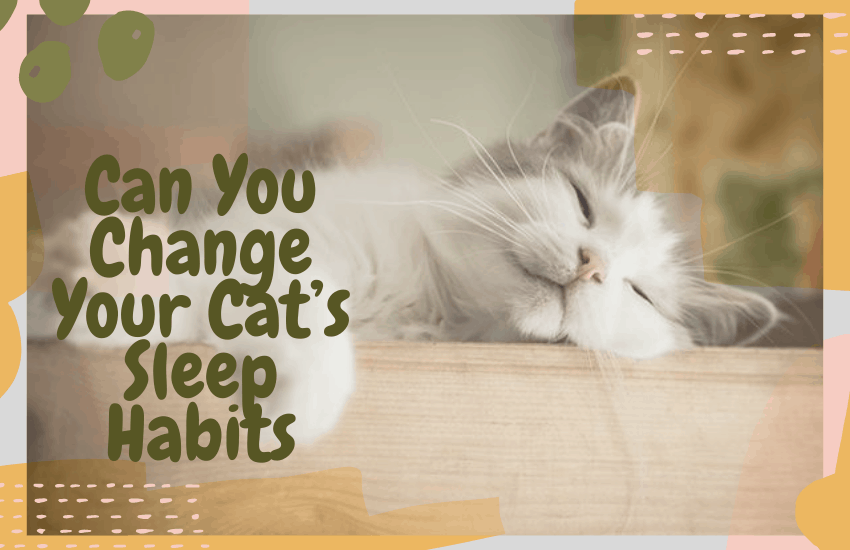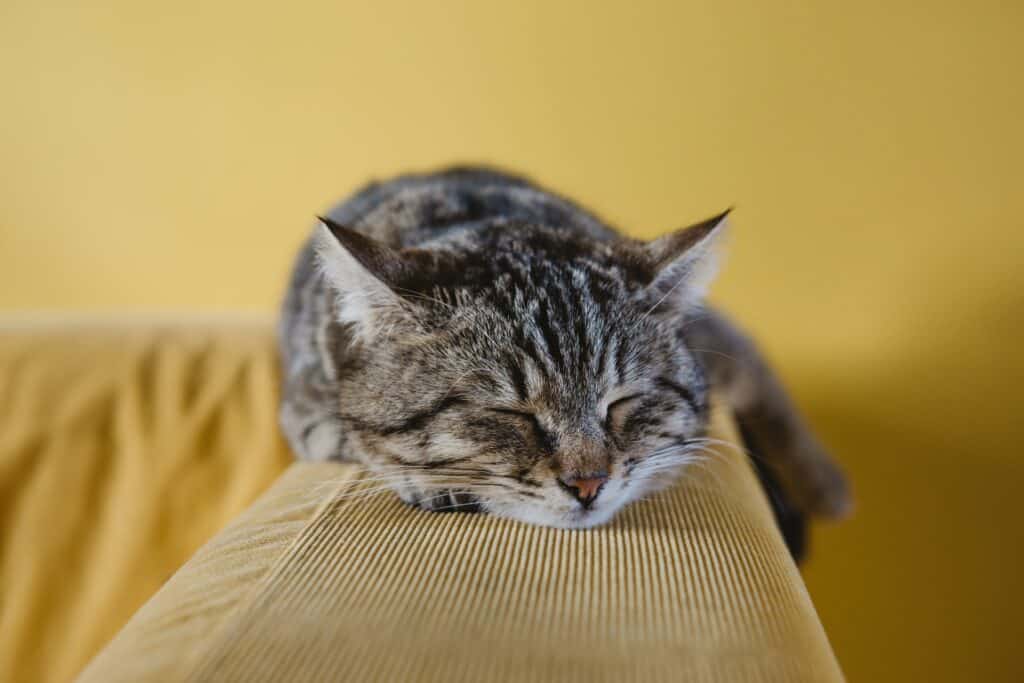
As any cat parent knows, cats sleep a lot. More often than not, we can find our fur babies curled up in a sunny spot as we come and go. Sure, they must be awake at some point throughout the day since they seem to migrate from one comfy spot to another, but the number of times we come home from work to find our cats in the same position we left them in eight hours earlier seems endless. Despite their seemingly endless napping, it seems cats can always be counted on to have a burst of frantic energy as their humans settle down for the night.
So, what’s the deal? Why can our furry friends go all day with only a few moments of liveliness, only to perk right up at the most inopportune times-namely when we’ve had a long day and look forward to a good night’s sleep! Maybe it’s a conspiracy. Or maybe they’re just trying to remind us who’s really in charge. One thing is for certain, it isn’t uncommon for cat parents to suffer from a lack of sleep, all thanks to a sudden burst of energy just as they are winding down for the night. The question on every cat parent’s mind seems to be is it possible to change your cat’s sleep habits to align with your own?

Table of Contents
A Cat’s Natural Sleep Habits
Before we get into whether or not you can change your cat’s sleep habits, it’s important to know the facts behind their sleep schedule. Cats are crepuscular, meaning they are the most active during the twilight hours of dusk and dawn. In the wild, this is the most common time for cats to hunt because other predators tend to lay low until it gets much darker.
The amount of sleep a cat needs can vary depending on their age. Most cats sleep around ten to fifteen hours each day, but some cats need more sleep than others. Any cat parent knows a kitten is a bundle of energy and will notice they are very active throughout the day and night. Because they are growing and require more food than adult cats, they have excess energy to burn.
While senior cats fall into the category of cats that sleep for longer periods of time than others, it’s not uncommon for them to be awake at night. Senior cats that are suffering from hearing loss or poor eyesight can become disoriented during the night, causing them to meow or be restless throughout the night. If you have a senior cat who experiences disorientation, you should call your veterinarian to see what can be done to help your cat stay calm.
Can a Cat’s Sleep Habits Be Changed?
Now that we know why cats sleep during the day and become active at night, we can move on to whether or not it is possible to change their sleep habits. The verdict? Absolutely!
Despite their reputation as persnickety creatures, cats are surprisingly social and adaptable. Since she loves you, she will more than likely adjust her sleep schedule naturally just to spend more time with you. This may not happen overnight but there are a few things you can do to help the process along.
Address Any Health Issues
If you notice your kitty is restlessly roaming the house at night, there’s a possibility that she is suffering from an underlying health problem that makes it difficult for her to wind down and sleep through the night. While there are a number of diseases that may cause a decrease in her activity levels, there are also some, like hyperthyroidism, that can cause her to be more active. Pain from a cardiovascular or respiratory disease will also have an impact on a cat’s ability to sleep through the night; this increase in activity might just be more noticeable later in the evening.
Whether she’s become lethargic or has suddenly become more active, it’s best to tackle the issue head-on and make sure all is well. If you notice any odd changes in her behavior, touch base with your veterinarian to pinpoint what’s going on.
Help Her Stay Active
Keeping your kitty active is one of the best ways to tire her out. Keep her active throughout the day to tire her out. If you live in a residential or quiet area and have a cat harness, try taking her outside for a walk and a change of scenery. By devoting time each day to play with her or explore new places, you’re not only burning off the excess energy that keeps her active all night long, but you’re also bonding with her.

While it’s not realistic that you will be home all day to play with her, there are some great interactive cat toys that will keep her stimulated and encourage curiosity while you’re away. Toys like a treat maze or a ball toy are inexpensive options that cats seem to love! If your budget allows it, an automatic laser light toy is also a fun option to keep your cat busy and burn off energy.
It’s also suggested to have a play session before bed to ensure she’s tired out for bedtime and will, in turn, allow you both to have a more peaceful night. Try to play for about fifteen or twenty minutes before beginning your nighttime ritual before bedtime.
Create a Bedtime Ritual
Sticking to a schedule is going to go a long way when it comes to changing your cat’s sleep patterns. By creating a routine each night, she is going to get used to following your lead when it comes time to relax for the night. It may sound tedious, but it doesn’t have to be! Incorporating these small actions into your nightly routine is super easy.
One of the best things to incorporate into your nightly routine is a set feeding time. After eating a filling meal, cats tend to get a little sleep, so by adjusting her feeding schedule to later in the evening or right before bed, is going to help get her primed for a good night’s rest. If sticking to a set time each night seems daunting or unrealistic, consider getting a timed feeder. This one from PetSafe is highly rated and will work wonders if your schedule is unpredictable and you don’t have to worry about coming home to a disgruntled feline!
After dinner, create a calm, relaxing atmosphere by turning down the lights and keeping things like the TV or music quiet. Having a comfy spot for her to curl up in is also a great idea. Invest in a cozy cat bed or a soft, warm blanket for her to snuggle into when she decides to settle down for a snooze.
In the Meantime
Since cats are naturally used to being active during the early morning and evening hours, it is going to take some time for changes in her sleep schedule to take effect. It goes without saying that this process requires a little bit of patience on your part. If you’re losing too much sleep and need a solution sooner rather than later, there are a couple of quick steps you can take while she adjusts to her new schedule.
The simplest solution to getting a good, uninterrupted night of sleep is to shut your bedroom door. While that seems pretty straightforward, not everyone is able to do it. If you’re one of those people, a ScatMat or a spray like the PetSafe SSSCat Spray Deterrent are both effective ways to block her from entering your room and allow for you to get some sleep.
If you choose to get a ScatMat, set it up in the doorway to the bedroom. When she tries to cross the threshold, the ScatMat will emit a small electrical pulse when she steps on it, which will deter her from entering the room. The PetSafe SSSCat Spray Deterrent works just as well as the ScatMat when it comes to keeping your cat out of certain areas, but it works by using a motion detector and will emit a puff of harmless, odorless spray when she gets too close to the doorway or an object you’d like her to leave alone.
If you don’t want to go as far as to lock her out of the room, you can also try ignoring her behavior when she starts getting wild in the middle of the night. By not acknowledging her behavior, you don’t have to worry about reinforcing or encouraging her behavior. After all, in her mind, any attention is good attention!
It may take some trial and error to figure out what works for the both of you, but it’s reassuring to know it can be done. Before you know it, you can say goodbye to you cat’s rambunctious nighttime behaviors and say hello to a purrrfect night of sleep!
Continue reading:


Leave a Reply